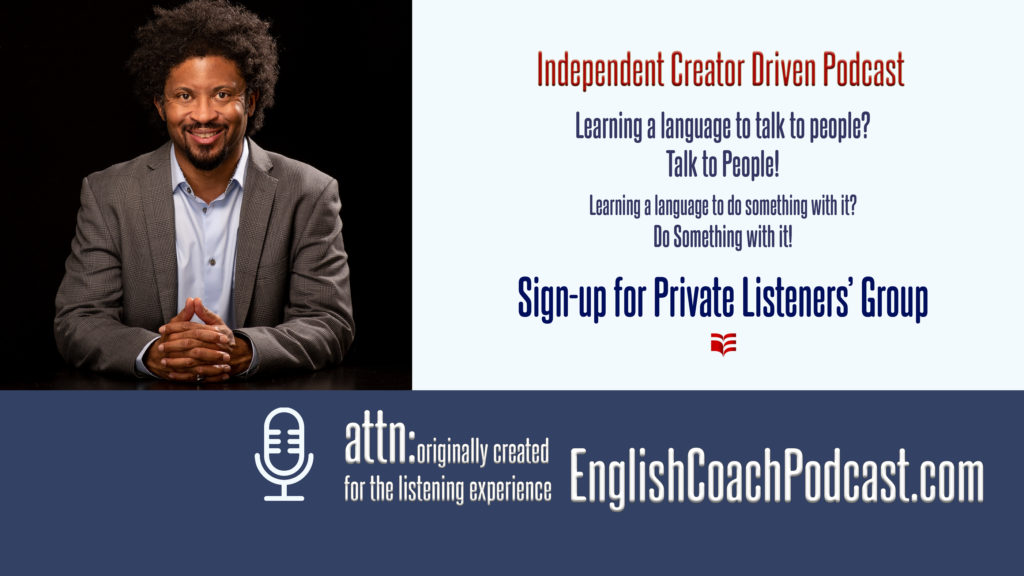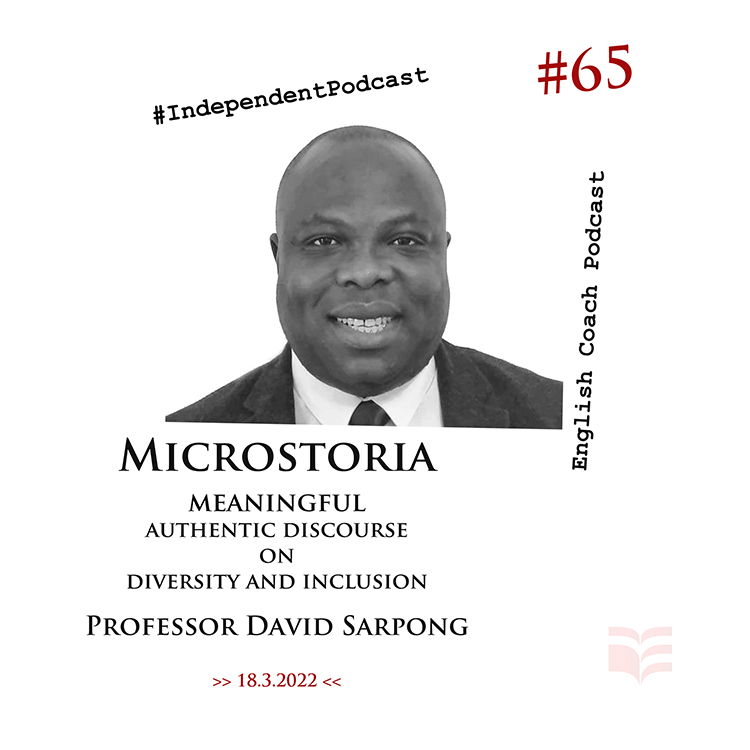Conversations with David Sarpong
| JOIN Private Listeners’ Group | Recommended 3rd-party apps | Sister Show |

ShowNotes – Video Exclusive
InstaGimmick
Questions approached in episode 65
The title of minority appears in many forms – not the least of which is voice.
The notion of giving voice features prominently in my English language training practice by default. If a learner of a foreign language can on this basis find themself sporting the status of minority – how can mindfullness of Microstoria help?
“Finding voice” – what does that mean to you?
How do these aspects play out in our personal and professional lives?
What are the things, people, and / or events that served to amplify this line of thought and awareness?
Professor David Sarpong
Professional Links: Works | LinkedIn
Professor of Strategic Management and Head of the Strategy, Entrepreneurship, and International Business (SEIB) Research Group. He started his first degree in 2002 at the Europa Universität Viadrina but left after his second year to continue at the University of the West of England, Bristol, where he received a First class in Business Administration. He went on to complete a PhD in Strategic Management in 2010. An elected Vice Chair of the British Academy of Management (BAM), David serves on the BAM Council’s Sub-Committee of Academic Affairs of Conference and Capacity Building (AACCB) and is a former Convenor of the Annual Doctoral Symposium of the Academy. A Senior Visiting Research Fellow at the Higher School of Economics (HSE) Laboratory for Economics of Innovation, David has since 2015 conducted research on Russia’s Basic Research Program (RBRP) on ‘Global Competitiveness’ at the National Research University in Moscow. He is Associate Editor for the Journal of Strategy and Management, and currently enjoys a Visiting Professorship at the Bristol Business School, and an Honorary Research Fellowship at the School of Management, IT, and Public Governance, University of Kwazulu-Natal, South Africa.
David’s research is practice and process-oriented and frequently draws on Heideggerian-Wittgensteinian approaches to social practices to engaging with cross-level management research problems. His research interests lie primarily in the broad areas of strategy and innovation, and his current research concerns relationalism and process theory, second-order technology and innovation management, strategy-as-practice, strategic foresight and temporality, discursive practices, and the making of European cosmopolitan marketplaces. Methodologically, much of his work is qualitative oriented and focuses on theorising organizing repertoires, performative routines, and how activities, dispositions, and choices get ordered over time to shape innovation and strategy in organizing. He frequently employs MICROSTORIA, narratives, and publicly available archival datasets for his empirical inquiries.
David has authored 120+ articles in refereed academic journals, international conference proceedings, and book chapters. His recent edited book on ‘Strategic foresight and innovation management’ was published by Routledge in 2020, and his very recent papers have appeared in various outlets, including Work, Employment and Society, International Marketing Review, Economic and Industrial Democracy, Journal of Business Research, Technological Forecasting and Social Change, IEEE Transactions on Engineering Management, R&D Management, Technovation, International Journal of Production Research, Science and Public Policy, Journal of Technology Transfer, Scandinavian Journal of Management, Production Planning and Control, European Urban and Regional Studies, Environmental Science and Policy, Journal of Economic Issues, International Journal of Entrepreneurial Behaviour and Research, and the International Journal of Human Resource Management.
Get direct episode-emails | Recommended 3rd-party apps | Local Player | Apple Podcasts | Overcast App | Spotify | Google Podcasts | Amazon Music | YouTube | Instagram |
“The English Coach Podcast – never intentionally takes a prescriptive, patronizing, or condescending stance to the adult learning experience, but is rather driven by inclusiveness – of people, approaches, personal experiences thoughts and ideas. This show episode is neither a formal lesson nor a substitute for such but aims to supplement the adult learning experience in a true-to-life way. The show is independent and self-sponsored – brought to you by me – a practicing language Trainer / Coach – and draws on a whole gamut of tools and tips in support of providing information, entertainment and what I like to call sustainable language acquisition in an authentic, relatable, and vastly collaborative – human way.“
English Coach Podcast – Living the Language – iAntonio
Thanks for listening, looking forward to hearing from you and bye for now.
Ian Antonio Patterson – ShowHost
Sustainable Language Acquisition = Nachhaltiger Spracherwerb.
English Training Englisch Coaching


